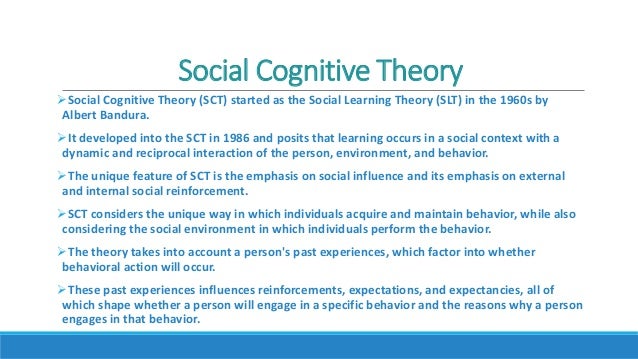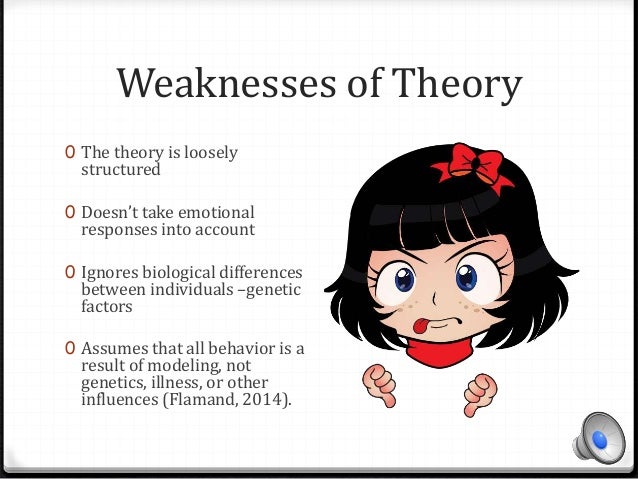People are viewed as so dynamic that it is difficult to implement the theory in its entirety. The third limitation is the fact that the theory does not focus on motivation and emotion since the focus is only through past experiences so the focus on these areas is minimal.
Self-efficacy is a mediating variable in the model and is.

Social cognitive theory limitations. Ignoring Standard Milestones Unlike stage models of child development social learning theory doesnt hinge upon a distinct progression of learning and growth that is chronological or age dependent. Moreover in terms of the methodological approach Piagets theory had some ethical and bias problems as he studied his own children. Focused on important theoretical issues eg role of reward in learning the.
Limitations to the Model. Since this theorymodel focuses greatly on only a portion of an individual and their personality their own self as a whole can be missed since it isnt taken into. However despite this assertion surprisingly few studies manipulate televised message.
Piaget also neglected cultural and social interaction factors in the development of childrens cognition and thinking ability. Limitations of the model include the following. There are certainly limitations to this theory and the first limitation is that we should change the way we think to change how we behave and feel.
Limitations of Social Cognitive Theory Loosely Structured. Because social cognitive theory is so broad it has been criticized for lacking any one unifying. However this theory has several limitations.
A major component of the theory is observational learning. The theory also has the limitation of poor organization and therefore provides the challenge of understanding the actual behaviors. But collaboration and participation differ for every individual and thus inequalities exist for each person.
A student with autism for example may not extract the same meaning from group interaction. Social Cognitive Career Theory or SCCT is different to but at the same time complements both Person Environment or trait and factor theories as well as developmental theories Lent 2013 pp. Cognition is defined simply as a process of our thinking.
Symbolizing capability forethought capability vicarious capability ability to learn through observationimitationmodeling others behaviors and attitude self-regulatory capability and self-reflective capability. According to this theory human functioning is described in terms of a number of basic capabilities. Bandura 1986 2002b which suggests that depictions of liked characters experiencing either rewards or punishments for their actions will influence viewers to be either more or less likely to perform those behaviors themselves.
Because social cognitive theory is so broad it has been criticized for lacking any one unifying principle or structure. Limitations of Social Cognitive Theory. The theory views people as active agents who both influence and are influenced by their environment.
Instead implementation is likely to focus on one or two concepts such as self-efficacy. Not a fully systematized unified theory. It defines the very act of.
The view of this theory as neglecting to consider the childs development across all of the domains is a potential weakness. This isnt always as easy as it might appear. However it ignores that as people move through life their behavioral patterns can change drastically with little change to their environment.
An evolving theory that is open to change 4. Despite this limitation CBT has become the 1 treatment. An evolving theory.
Concerned with important human social behaviors 3. The theory assumes that changes in the environment will automatically lead to changes in the person when this may not. It has been said by researchers that in the Social Cognitive Theory its perspective can ignore the internal and unconscious thought processes and emotions.
According to Albert Bandura behavior is largely learned. Strengths of Social Cognitive Theory. Perhaps the most often cited strategies stem from social cognitive theory SCT.
It was hypothesized that a PA intervention program based on the social cognitive theory SCT will modify fasting blood sugar FBS among rural people with prediabetes which in turn will result in a decrease in diabetes incidence in the rural area. The process of learning desirable and undesirable behaviors by observing others then reproducing learned behaviors in order to maximize. It incorporates Banduras triadic reciprocal model of causality.
The theory is loosely organized based solely on the dynamic interplay between person behavior and environment. Social Cognitive Learning Theorys Limitations Strengths and Weaknesses 1. Advocates of the social cognitive theory also assume that behavior is primarily learned through observation expectation and reinforcement.
Accumulated an impressive research record 2. Differences in skill-set are always present offering constraints in learning. Concerned with important human social behaviors.
Focused on important theoretical issues eg role of reward in learning the stability of behavior. Social Cognitive Theory SCT proposes that the environment behavior and personal and cognitive factors all interact as determinants of each other 514. Social cognitive theory was developed by Stanford psychologist Albert Bandura.
Accumulated a large research record. However SCCT is closely linked to Krumboltz Learning Theory of Career Development. Theory viewed social groups as being a whole and equal with the probability to take out the same meaning from social interaction.
Halaman
Monash
Labels
-
The less-used punctuation symbols are virgule underline ellipsis points square brackets etc. The Well-Known Punctuation Errors to Know Befo...
-
Tuition runs 13770 for in state students and 13770 for out of state students. In a segregated post-Civil War country historically Black col...
-
If certain topics names or concepts appear more than once underline or highlight them and make sure they are prominent in your study guide....
-
Pay us a visit for some great gear tomorrow between 12-3 PM. 4th Sunday of Easter. Nhs Senior Induction Ceremony Program Updated INDUCTI...
-
In Ohio that included the Seneca Delaware Shawnee Ottawa and Wyandot. Erie Indians Honniasont Indians. Ohio Ohio History Central In 1712...

